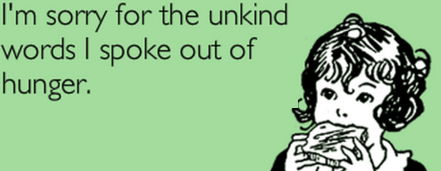In one of our earlier blogs, The Three Faces of Willpower, we discussed the factors that favour and those that work against our willpower, as described in Kelly McMonigal’s book, The Willpower Instinct.
One particular enemy, challenged blood glucose levels, deserves special mention. In our house we call this Bryant Syndrome, after my husband. He is prone to go long periods of time without eating, and thus is particularly susceptible to the “crabbies” from low blood sugar. My daughter Lauren, now a chef, can spot its onset in a nanosecond. A perceptive child, at first she used to demand of Glenn “What’s the matter with you? Why are you so grouchy?” Oddly, this was not well received, so over time, she learned to ask, more diplomatically, “How long has it been since you have eaten?” Today, when her “crabby detector” pings, she simply hands him a sandwich. I have sometimes wondered if her choice of profession was really a bid to deal with Bryant Syndrome on a more global scale.
Because food is so plentiful, and so many of us are engaged in the battle of the bulge, we tend to underestimate how much of a role this plays in our ability to manage ourselves. Matthew Gailliot, a young psychologist who worked with Roy Baumeister, author of The Physiology of Willpower: Linking Blood Glucose Levels to Self-Control, conducted some early experiments on this. He demonstrated that boosting blood sugar levels restores willpower, and that low blood sugar levels tend to predict a wide range of failures of willpower, from throwing in the towel on a difficult test, to lashing out at others when angry.
This finding was greeted with broad smiles by those of us secretly longing for scientific permission to stock up on lifesavers and cookies. After all, I’m managing my willpower!! Unfortunately, it proved too good to be true, sort of. Galliot, now professor at Zirve University in Turkey, took his work a bit further. It turns out that it’s not the absolute level of blood sugar present, it’s the CHANGE in level to which we are so acutely attuned.
The human brain has a very small supply of energy. It can’t store it very well, so it’s dependent on glucose in the blood. We have special detector cells constantly monitoring the available energy, and when it detects a drop – look out!
Additional work in this area has been done by X.T Wang, a behavioural economist and Robert Dvorak, a psychologist, both from University of South Dakota. They have put forth the idea of an “energy budget” model of self control. They argue the brain treats energy like money. It spends it when resources are high, and saves it when resources are dropping. And when the level starts dropping, the first thing to go is self-control.
This is because the human brain likely uses blood sugar levels as a proxy for signs of scarcity or abundance in the environment. On the Serengeti, our diet was mostly low glycemic. No Oreos. We didn’t suffer the big swings in glucose levels caused by hoovering up high-fructose corn syrup. Low blood sugar tilts the brain toward immediate gratification, or survival. This makes sense. Our primal ancestors who followed their appetites and impulses lived to plan another day.
Extra body fat used to be life insurance. But in a world filled with soft drinks and fast food, our ability to resist foods is more important for survival than the ability to find it.
This same mechanism also rewarded those who take chances, or risks. Those who were prepared to go into unfamiliar territory to hunt for game, were also more likely to survive. So loss of control, or risk taking, may be ancient instinct for strategic choice.
Well, the world no longer rewards this instinct, except on Wall Street, apparently. Our greater need and challenge is to control our short-term impulses in order to fulfill our longer-term agendas.
Perhaps anyone in charge of a hedge fund should be restricted to a low glycemic diet. Just sayin’…

